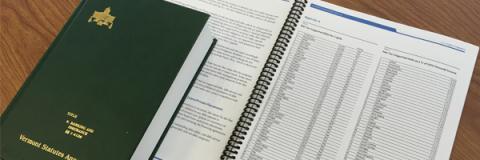Montpelier, VT – On May 15, Gov. Phil Scott signed into law S.27, a proposal brought forward by Treasurer Mike Pieciak to eliminate up to $100 million in medical debt for middle- and working-class Vermonters and remove medical debt from credit scores. The bill passed the Legislature on a unanimous, bipartisan vote and requires no additional taxes or fees.
“Rising health care costs are pushing Vermonters to a breaking point, leaving too many with medical bills they can’t afford,” said Treasurer Pieciak. “This program will relieve tens of thousands of Vermonters of their medical debt—freeing them to invest in their futures without raising taxes. I want to thank the Governor and the Legislature for unanimously supporting this important investment in a healthier, more secure future for our state.”
Senator Ginny Lyons, Chair of the Senate Health and Welfare Committee, and the Senate’s lead sponsor, highlighted that the one-time program is a timely response to the growing cost of care in Vermont. “As health care costs outpace what most Vermonters can afford, S.27 is a smart, one-time investment that will deliver immediate relief,” said Senator Lyons. “This bill offers a hand up to those who need it most—helping them move forward with their lives without medical debt holding them back.”
Representative Alyssa Black, Chair of the House Health Care Committee, and the House’s lead sponsor, said, “S.27 passed with unanimous support for a reason—we’re all one health emergency away from a lifetime of financial ruin. This bill is an important step in ensuring that when someone is sick or injured, their focus can remain on their health—not their finances.”
Medical debt is the leading cause of bankruptcy in the U.S., burdening over 60,000 Vermonters. Because patients rarely know the cost of care upfront, and they often have no choice but to incur it, medical debt can be difficult to avoid.
Individuals who carry medical debt are less likely to seek care when they need it, leading to worse health outcomes, more expensive care in the future, and missed time at work. A 2021 survey by the Vermont Department of Health found that 85,000 Vermonters delayed or avoided care due to fear of medical debt.
Mike Del Trecco, President of the Vermont Association of Hospitals and Health Systems, emphasized that medical debt affects not just patients, but the entire health care system in Vermont. “Medical debt can deter Vermonters from getting the care they need, even after the debt is no longer being pursued by collectors. This often leads to affordability issues for Vermonters and more expensive care across the delivery system,” said Del Trecco. “At a time when our health care system is under immense strain, S.27 helps break this harmful cycle—supporting better health outcomes and the long-term stability of care in our state.”
Andrea and Steve Charest, owners of Petra Cliffs Climbing Center & Mountaineering School in Burlington, know firsthand how a medical emergency can upend a family’s life. “After Steve’s life-threatening fall in Smugglers’ Notch, our family faced not only a long and painful recovery, but also the crushing weight of medical debt—despite community support and insurance,” the Charests said. “That financial toll continues to this day. We support this proposal because no Vermonter should be left behind when tragedy strikes. Relief from medical debt gives families like ours the chance to heal and move forward.”
Under S.27, the State will partner with a nonprofit to purchase medical debt from providers at pennies on the dollar of its original cost. Once acquired, the debt will be forgiven and any negative impacts to the debtor’s credit will be removed. Vermonters will be automatically enrolled in the program—no forms, no hassle.
Vermonters will be eligible for debt relief if they (1) have debts in “terminal bad debt status” or (2) meet one of the following financial criteria:
-
Belong to a household at or below 400% of the Federal Poverty Level (currently $60,240 for an individual, $124,800 for a family of four)
-
Have medical debt that equals or exceeds 5% of their household income.
The program uses a one-time $1 million investment from funds previously appropriated to the Treasurer’s Office to buy down outstanding state bonds. Using this funding source, S.27 will not increase fees or taxes for Vermonters.
States like Rhode Island have adopted similar initiatives, successfully eliminating medical debt for their most vulnerable residents.
Pieciak emphasized that, while S.27 is an important step toward addressing Vermont’s high health care costs, more work is needed to fix Vermont’s broken health care system.
“Vermonters already pay some of the highest health care costs in the country, and year after year, they're asked to pay more—even as access to care becomes less certain,” said Treasurer Pieciak. “To ensure Vermonters can access the care they need—when they need it—without going bankrupt, we must invest in bold, long-term solutions that make our health care system more affordable, accessible, and high quality for all.”
Treasurer Pieciak will provide regular updates on the purchase and forgiveness of medical debt from local providers. Learn more about the program here.
###





